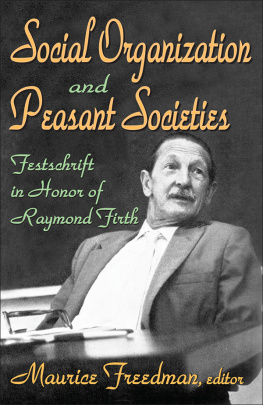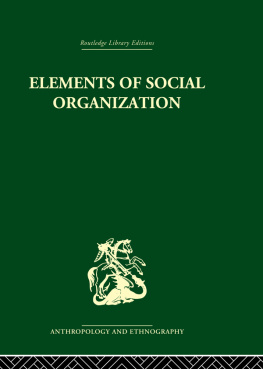Routledge Library Editions
CAPITAL, SAVING AND CREDIT IN PEASANT SOCIETIES
ANTHROPOLOGY AND ETHNOGRAPHY
Routledge Library Editions
Anthropology and Ethnography
RAYMOND FIRTH: COLLECTED WORKS
In 6 Volumes
| I | Capital, Saving and Credit in Peasant Societies | Firth & Yamey |
| II | Elements of Social Organization | Firth |
| III | Primitive Polynesian Economy | Firth |
| IV | Social Change in Tikopia | Firth |
| V | Themes in Economic Anthropology | Firth |
| VI | We, the Tikopia | Firth |
CAPITAL, SAVING AND CREDIT IN PEASANT SOCIETIES
Studies from Asia, Oceania, The Caribbean and Middle America
EDITED BY RAYMOND FIRTH AND B S YAMEY
First published in 1964
Reprinted in 2004 by
Routledge
2 Park Square, Milton Park, Abingdon, Oxon, OX14 4RN
Transferred to Digital Printing 2006
Routledge is an imprint of the Taylor & Francis Group
1964 George Allen & Unwin Ltd
All rights reserved. No part of this book may be reprinted or reproduced or utilized in any form or by any electronic, mechanical, or other means, now known or hereafter invented, including photocopying and recording, or in any information storage or retrieval system, without permission in writing from the publishers.
The publishers have made every effort to contact authors/copyright holders of the works reprinted in Routledge Library Editions Anthropology and Ethnography. This has not been possible in every case, however, and we would welcome correspondence from those individuals/companies we have been unable to trace.
These reprints are taken from original copies of each book. In many cases the condition of these originals is not perfect. The publisher has gone to great lengths to ensure the quality of these reprints, but wishes to point out that certain characteristics of the original copies will, of necessity, be apparent in reprints thereof.
British Library Cataloguing in Publication Data
A CIP catalogue record for this book is available from the British Library
Capital, Saving and Credit in Peasant Societies
ISBN 978-0-415-33015-2
Miniset: Raymond Firth: Collected Works
Series: Routledge Library Editions Anthropology and Ethnography
Capital, Saving and Credit in Peasant Societies
STUDIES FROM ASIA, OCEANIA
THE CARIBBEAN
AND MIDDLE AMERICA
Essays edited with two general essays by
RAYMOND FIRTH and B. S. YAMEY
London
GEORGE ALLEN AND UNWIN LTD
RUSKIN HOUSE MUSEUM STREET
FIRST PUBLISHED IN 1964
This book is copyright under the Berne Convention. Apart from any fair dealing for the purposes of private study, research, criticism or review as permitted under the Copyright Act, 1956, no portion may be reproduced by any process without written permission. Enquiry should be made to the publisher.
George Allen & Unwin Ltd, 1964
With the exception of an historical sociologist to whom economics is no novelty, the authors of all the descriptive essays in this volume are social anthropologists, some with and some without formal training in economics. All have been impressed by the significance of a knowledge of economic processes and relationships for the understanding of the social relationships with which they are primarily concerned. Conversely, they have been impressed by the necessity of an understanding of social relationships for the interpretation of observed economic situations and behaviour. This book has been planned to present detailed studies, drawn from a variety of peasant societies, to illustrate this theme of the inter-action between social and economic factors, and the nature of the contribution of social anthropology to its study. It is also planned to show the interest and significance of such anthropological studies for students of the economics of under-developed countries.
To delimit the scope of the individual essays, it was decided to confine them within an area of some specific, though broad, group of related topics. Since the formation and management of capital are central to the economic functioning and growth of all but the simplest societies, we have chosen capital, saving and credit as the appropriate band of topics, leaving it largely to the individual authors to decide where, within this band, to place the major emphasis in their essays. We have not tried, that is, to impose a common pattern of content on all the essays; their authors have written about those phenomena or problems, within this broad field, which interested them most.
The essays cover a wide field geographically. They omit Africa, which in recent years has tended to take the lions share of scientific publication in this socio-economic field. But they provide examples from two other continents and various oceanic areas; with two exceptions, all deal with communities in the tropical zone (see map). Culturally, the range also is wide, from small communities of fairly simple structurePacific islanders, Persian nomads, tribal villagers in Eastern Indian highlandsto sectors of more massive traditional farming societies of more elaborate structure, in south-east Asia and in Meso-America; and to the relatively sophisticated and complex societies of Mauritius, the Caribbean and the Maori of New Zealand.
As chapters in this volume the essays are not grouped either regionally or in any very strict thematic order. They are, however, arranged with general reference to the main problems and types of economic situation dealt with in each. An essay by one of the editors begins the volume with an extended outline discussion of the main problems and issues. An essay by the other editor ends the volume with some comments and questions from an economists point of view. The volume on its descriptive side begins with the examination of a credit system in a non-monetary stationary economy of apparently primitive type, and of operations in a more advanced system which still uses both monetary and non-monetary media side by side. Capital and investment problems among a money-using folk who still practise pastoral nomadism as a way of life are then considered. Then follow studies of capital and its management among traditional Asian peasantry in four countriesfarmers for most of whom rice is a staple crop but who have other significant forms of production as well and who have a fairly wide range of economic choice. Aspects of rural savings and credit associations appear in many of the essays, but are specifically considered in further material from the south Pacific. Another two essays focus especially on questions of capital in market trading. In several of the preceding essays comparison is significant. But comparative economic performance between communities is studied specifically for Middle American examples, and is to the fore in the consideration of the position of some communities of Asian origin and plantation background, in situations of much ethnic diversity. Finally, an essay of much broader character summarizes and comments on relevant data for a major agricultural area, rural India. Though overtly it is very different in its statistical survey materials from the other essays, this essay belongs to the volume by reason of its complementary approach and its insistence on the need for a combination of economic and anthropological techniques of enquiry into these problems of capital and credit in peasant societies.







